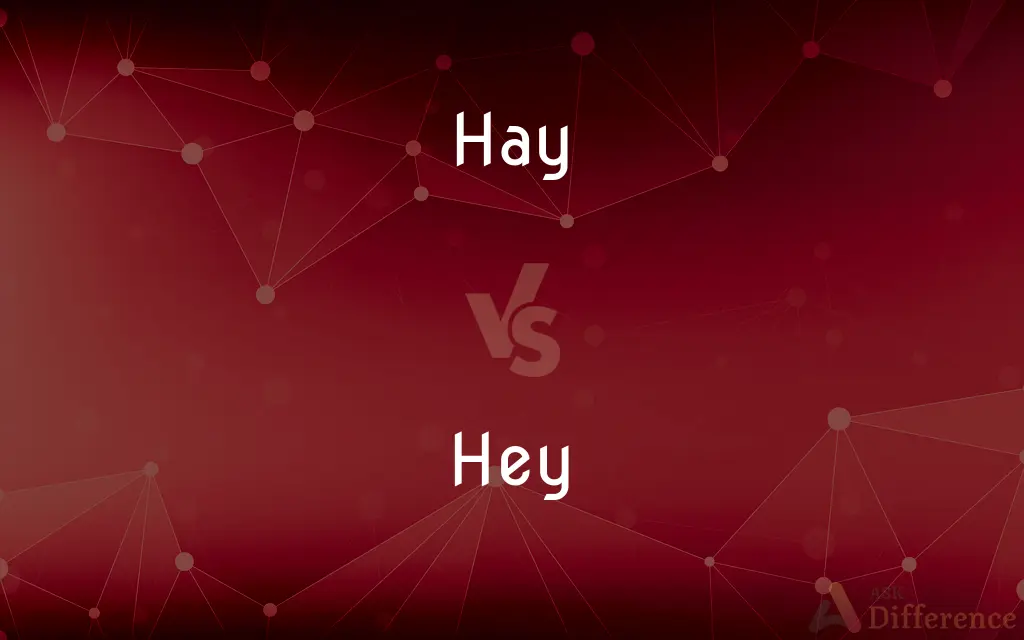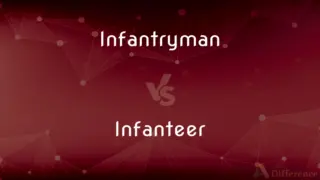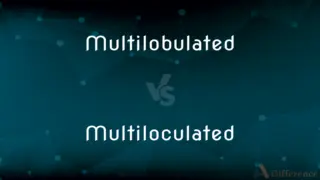Hay vs. Hey — What's the Difference?
By Tayyaba Rehman & Maham Liaqat — Updated on April 4, 2024
"Hay" is dried grass used primarily as animal fodder, while "Hey" is an exclamation used to attract attention or express surprise, interest, or annoyance.

Difference Between Hay and Hey
Table of Contents
ADVERTISEMENT
Key Differences
Hay is a tangible material, made by cutting and drying grass, legumes, or other herbaceous plants, used mainly in agriculture as food for grazing animals like horses and cattle. Its production involves a specific process of harvesting, drying, and storing to preserve its nutritional value for livestock consumption. In contrast, "Hey" is an intangible interjection, a word used in spoken and written language to express a range of emotions, from calling for attention to showing surprise or concern. It's versatile in communication, serving as a greeting, a call for action, or an expression of astonishment.
The significance of "hay" extends beyond its agricultural use, often appearing in idiomatic expressions such as "make hay while the sun shines," highlighting its embeddedness in cultural narratives about opportunity and the importance of timing. Meanwhile, "Hey" has evolved in its usage over time, becoming a casual greeting in modern English, akin to saying "Hello" or "Hi." It reflects the dynamic nature of language and how certain words adapt to fit new social contexts and communication needs.
While "hay" plays a crucial role in the agricultural economy, contributing to the feeding and maintenance of livestock, "Hey" serves as a linguistic tool that facilitates human interaction. Its informal nature makes it a common choice in casual conversations, both in person and in digital communication. This contrast underlines the functional divergence between a word rooted in the physical needs of agriculture and an expression that caters to the social and emotional aspects of human communication.
The primary distinction between "hay" and "Hey" lies in their respective roles in physical and linguistic environments. "Hay" is essential for sustenance in farming contexts, whereas "Hey" is a flexible element of language, used to engage, surprise, or communicate with others.
Comparison Chart
Nature
Physical, a type of fodder.
Linguistic, an interjection.
ADVERTISEMENT
Usage
Agricultural, for feeding animals.
Communication, to attract attention or express emotions.
Process of Creation
Harvesting, drying, and storing grasses.
N/A, a part of natural language evolution.
Significance
Nutritional value for livestock.
Emotional or attention-grabbing in conversation.
Variations
Different types based on grass or legume.
Used with varying intonations to convey different meanings.
Cultural Aspect
Idioms like "make hay while the sun shines."
Casual greeting or call for attention in various languages.
Compare with Definitions
Hay
Integral to livestock health and farming.
Quality hay is essential for the dairy cows' nutrition.
Hey
Used for emphasis in conversation.
Hey, that's a great idea!
Hay
Often stored in large bales.
The barn was filled with freshly baled hay.
Hey
Can indicate annoyance.
Hey! Watch where you're going!
Hay
Dried grasses used as animal feed.
The farmer stocked up on hay for the winter feeding of his cattle.
Hey
Used to express surprise.
Hey! I didn't see you there.
Hay
Subject of farming idioms.
They worked hard to make hay while the sun shines.
Hey
A casual greeting.
Hey, how's it going?
Hay
A key agricultural product.
Harvesting hay is a critical task in the summer for livestock farmers.
Hey
An exclamation to attract attention.
Hey, can you pass me the salt?
Hay
Hay is grass, legumes, or other herbaceous plants that have been cut and dried to be stored for use as animal fodder, particularly for large grazing animals raised as livestock, such as cattle, horses, goats, and sheep. However, it is also fed to smaller domesticated animals such as rabbits and guinea pigs.
Hey
Used to attract attention, to express surprise, interest, or annoyance, or to elicit agreement
Hey, what's going on here?
Hay
Grass or other plants, such as clover or alfalfa, cut and dried for fodder.
Hey
Used to attract attention or to express surprise, appreciation, wonder, or pleasure
"Oh, hey, you saw that ninety-nine-yard punt return in the Super Bowl? Wow, so did I!" (Don Pfarrer).
Hay
(Slang) A trifling amount of money
Gets $100 an hour, which isn't hay.
Hey
Used to express greeting.
Hay
To mow and cure grass and herbage for hay.
Hey
An exclamation to get attention.
Hey, look at this!
Hey! Listen!
Hay
To make hay on (a patch of land).
Hey
A protest or reprimand.
Hey! Stop that!
Hay
To make (grass or other plants) into hay.
Hey
An expression of surprise.
Hey! This is new!
Hay
To feed with hay.
Hey
An informal greeting, similar to hi.
Hey! How's it going?
Hay
(uncountable) Grass cut and dried for use as animal fodder.
Hey
A request for repetition or explanation; an expression of confusion.
Hey? How's that?
Hay
(countable) Any mix of green leafy plants used for fodder.
Hey
A meaningless beat marker or extra, filler syllable in song lyrics.
The chorus is "nana na na, nana na na hey hey hey, goodbye".
Hay
(slang) Cannabis; marijuana.
Hey
(country dancing) A choreographic figure in which three or more dancers weave between one another, passing by left and right shoulder alternately.
Hay
A net set around the haunt of an animal, especially a rabbit.
Hey
Alternative spelling of he
Hay
(obsolete) A hedge.
Hey
High.
Hay
(obsolete) A net placed around the lair or burrow of an animal.
Hey
An exclamation of joy, surprise, or encouragement.
Hay
(obsolete) An enclosure, haw.
Hey
A cry to set dogs on.
Hay
(obsolete) A circular country dance.
Hay
The letter for the h sound in Pitman shorthand.
Hay
To cut grasses or herb plants for use as animal fodder.
Hay
To lay snares for rabbits.
Hay
A hedge.
Hay
A net set around the haunt of an animal, especially of a rabbit.
Hay
Grass cut and cured for fodder.
Make hay while the sun shines.
Hay may be dried too much as well as too little.
Hay
To lay snares for rabbits.
Hay
To cut and cure grass for hay.
Hay
Grass mowed and cured for use as fodder
Common Curiosities
How is hay prepared?
Hay is prepared by cutting, drying, and then storing grasses to prevent spoilage and maintain nutritional value.
Is hay only made from grass?
Hay can be made from a variety of plants, including legumes and other herbaceous plants, not just grass.
How does the quality of hay affect livestock?
High-quality hay supports better health and productivity in livestock, while poor-quality hay can lead to nutritional deficiencies.
What are the nutritional benefits of hay for animals?
Hay provides essential nutrients and fiber, crucial for the digestive health of grazing animals.
Can the word "Hey" be considered rude?
Depending on the context and tone, "Hey" can be perceived as informal or overly casual, but not necessarily rude.
Is there a best time to harvest hay?
Yes, the best time to harvest hay is when it has reached optimum growth for nutritional content but before it has gone to seed.
In what situations is using "Hey" appropriate?
"Hey" is suitable for casual conversations, informal greetings, or when trying to get someone's attention in a relaxed setting.
What's the environmental impact of producing hay?
Hay production can impact the environment through land use and water consumption, but it's also a necessary part of sustainable agriculture for feeding livestock.
Can "Hey" be used in formal communication?
Typically, "Hey" is considered informal and is less common in formal contexts.
Why is hay important in agriculture?
Hay is a staple in animal diets, especially in regions where fresh pasture is not available year-round.
What factors affect hay quality?
Factors include the type of plants used, the timing of cutting, and the drying process.
How has the use of "Hey" evolved over time?
"Hey" has evolved from a call for attention to a versatile word used for greetings, expressions of surprise, and more, reflecting changes in language and social customs.
What role does "Hey" play in digital communication?
In digital communication, "Hey" often serves as an informal greeting or introduction in text messages and emails.
Can "Hey" be used to start a conversation?
Yes, "Hey" is commonly used to initiate conversations, especially in informal settings.
How do farmers store hay?
Farmers store hay in bales, either stacked in barns or covered outdoors, to protect it from the elements.
Share Your Discovery

Previous Comparison
Infantryman vs. Infanteer
Next Comparison
Multilobulated vs. MultiloculatedAuthor Spotlight
Written by
Tayyaba RehmanTayyaba Rehman is a distinguished writer, currently serving as a primary contributor to askdifference.com. As a researcher in semantics and etymology, Tayyaba's passion for the complexity of languages and their distinctions has found a perfect home on the platform. Tayyaba delves into the intricacies of language, distinguishing between commonly confused words and phrases, thereby providing clarity for readers worldwide.
Co-written by
Maham Liaqat














































